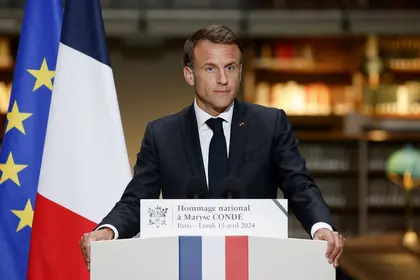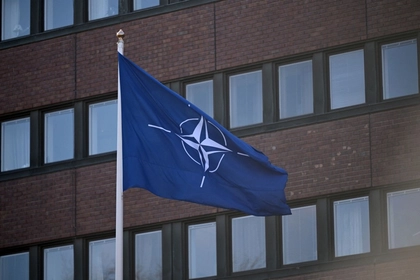France is asking the European Union to impose additional sanctions on Moscow for an alleged Kremlin-backed influence campaign to interfere with the upcoming European parliamentary elections and advance narratives or policies that are meant to divide the 27-member nation economic and political bloc.
A proposal led by France and supported by the Netherlands, Poland and the three Baltic nations of Estonia, Lithuania and Latvia, is seeking to impose more restrictive measures, Bloomberg News reported on April 24.
JOIN US ON TELEGRAM
Follow our coverage of the war on the @Kyivpost_official.
The call for additional sanctions come amid allegations that Russian state-backed entities and individuals are engaging in a continental-wide disinformation campaign ahead of the June elections to the bloc’s legislature, located in Strasbourg, France.
“Destabilizing activities executed by Russia-related actors have increased everywhere in Europe as well – as the Russian regime has taken actions to undermine democracy, stability and the rule of law through a variety of hybrid instruments,” the draft of the proposal said, as cited by Bloomberg.
France’s Minister for Europe Jean-Noël Barrot earlier this week was quoted as saying that “Russian disinformation campaigns… mimic authentic government or media services but instead post fake stories.”
The news comes on the back of a joint investigation by Czechia and Belgium earlier this month that alleges Russia has paid certain European members of parliament to promote pro-Kremlin narratives and sow discord in the EU.

2024 Olympics: Paris in The Starting Blocks
“Belgian intelligence services have confirmed the existence of pro-Russian interference networks with activities in several European countries and also here in Belgium. According to our intelligence service, the objectives of Moscow are very clear,” Belgian Prime Minister Alexander De Croo said, as cited by The Guardian earlier this month. “The objective is to help elect more pro-Russian candidates in the European parliament and to reinforce a certain pro-Russian narrative in that institution. It’s very clear.”
Moving on the revelation is an EU parliamentary proposal for a resolution “on Russian interference” that was introduced on April 24.
Its allegations are based on “joint action by Belgian and Czech authorities” having “uncovered Russian operations and revealed that members of the European Parliament had been paid to spread propaganda.”
Moscow has also been accused of interfering in US elections, including the 2020 presidential vote, the country’s Treasury Department alleges. The Treasury Department used its findings to on impose sanctions on 16 Russian entities and 16 individuals in April 2021.
Russia has reportedly improved the quality and increased the frequency of its disinformation and misinformation campaigns, Lithuania says.
“They had a significant impact on society and required a large amount of institutional resources to withstand [the campaigns],” Lithuanian authorities said in March, according to a dispatch from The Record.
More nefarious Russian activities have included assassinations and sonar-neurological attacks known as the “Havana Syndrome,” numerous investigations have found, including by the open-source intelligence outfit Bellingcat.
A joint investigation that included the US-based 60 Minutes weekly news program concluded that Russian defense intelligence (known by its acronym of GRU) was behind a worldwide phenomenon in what the US government has called “anomalous health incidents” that has led to permanent neurological damage in some cases.
US diplomats, spies and citizens have been victims of the neurological damage that started about a decade ago.
The specific intelligence unit’s number is 29155 and has also been traced to explosions carried out at European weapons depots that are known to store weapons scheduled for delivery to Ukraine.
In Ukraine, the GRU was heavily active and ramped up activity starting in 2014 when the initial Russian invasion of the country began.
You can also highlight the text and press Ctrl + Enter






